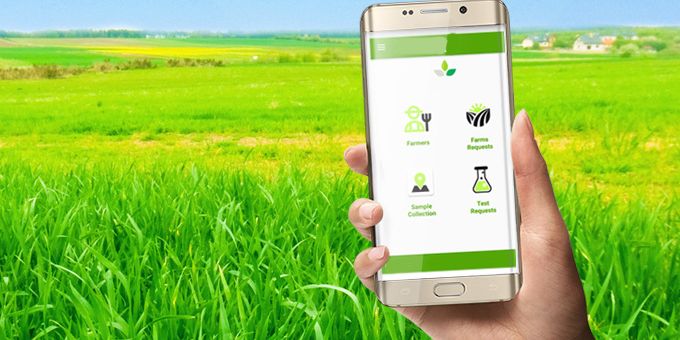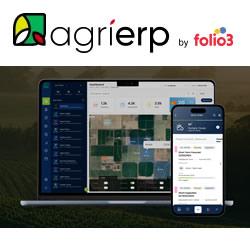We will see a lot more of agriculture apps in the not so distant future. Paper records are archaic and frustrating, as well as inefficient and monotonous. The future is in digital mobile apps.
 Farmers are Growing Comfortable with Mobile Apps
Farmers are Growing Comfortable with Mobile Apps

Len Calderone for | AgritechTomorrow
99% of U.S. farms are owned by individuals, families or small corporations. Less than one half of one percent are owned by large corporations. The farm population in the U.S. has declined from 22 million in 1880 to less than 5 million today, requiring efficient management systems.
There are more than 7 billion people on Earth, and this number will rise to almost 10 billion by the middle of this century. The demand for food will rise significantly. Therefore, farmers must rely on new technology, such as mobile apps.
U.S. farmers are utilizing smart phones to improve efficiency and produce higher profits. Farmers are realizing that time and money are saved by employing mobile devices. Farmers are using their smartphones for routine tasks, such as checking commodity prices, identifying weeds and pests, as well as checking the activity of watering equipment.
Smartphones provide portability and expediency in remote areas. When farmers combine these phones with specialized workforce management and data collection tools, the phones increase effectiveness, improve productivity and lead to financial gain for farmers.
The workforce management programs offer a reduction in paper usage, since the farmers record data onto their mobile devices. They customized data entry forms with customized forms for data surveys or work performance records. There are fewer data entry errors, by reducing the requirement for paper forms. In fact, users make fewer accidental errors, such as typing information from traditional paper forms into a computer.
These programs also have geotagging capability by adding geographical tags to data and then categorizing the data to show trends and improve farm management. They have intelligent dispatching using two-way communication. This allows field workers to be easily contacted and rerouted from one location to another, so that the workers can resolve equipment problems or livestock illnesses faster than past communications allowed.
There are applications for bees, which are a hot topic these days, that help reduce bee poisoning from pesticides for growers and beekeepers to consult while in the field. Farmers and beekeepers can now distantly check pesticide tables on their phones or tablets. There is popular guide that lists 150 insecticides, fungicides, miticides, slug killers, and growth disruptors, which can be searchable by trade name or chemical name in the app. This guide (Oregon State University Extension’s publication, “How to Reduce Bee Poisoning from Pesticides) recommends the best practices for managing pesticide applications to protect all bee species. It also states how to protect native ground-dwelling bee species such as squash bees, long-horned bees, sweat bees, mining bees, and bumblebees.
The California Leafy Greens Marketing Agreement has published an app intended to train field workers on how to properly wash their hands while on the job. Workers need to know when they should wash their hands, such times as after using the restroom, after eating, taking breaks, or smoking. Training workers to properly wash their hands and how to and when to use gloves and hand sanitizer can be hard and time-consuming. The training app contains step-by-step directions, clear captions, photographs, video footage, and exercises to reinforce the concepts.
Farmers now have information on dozens of insects and diseases that infect peaches, blueberries, strawberries, apples, pears, cherries, cranberries, and blueberries. MyIPM apps are accessible at the Apple Store and Google Play. The NED version includes fruit crops especially grown in the Northeastern U.S., and the SED version covers crops especially grown in the Southern U.S. The apps include tips on identifying and managing crop-threatening diseases with directions for farmers to manage disease control.
Farmers must understand the farm’s financials to be profitable. A farmer must analyze and improve the profitability of each field. Therefore, there is a need to quickly build a farm budget and track the cost of production and analyze the land costs per acre, bushel and contribution margin basis. This type of app spots opportunities to improve the profitability of a farm.
Data driven farming is provided by companies, such as Granular’s Farm Management Software, helping the farmer manage crop revenue and inventory, while estimating and measuring the yield from every field. It helps with crop inventory from field to storage to customer, while managing the farm’s marketing program. It can share data and production history with landlords, and customers.
Created in conjunction with farmers, Conservis is an easy-to-use farm management program that helps growers work smarter, not harder. It gathers, analyzes, and reports data all in one location. A farmer can troubleshoot in real time and see the big picture. Farming is a complicated business, but Conservis helps streamline and simplify all the stages of the growing process.
AgCinect has a comprehensive farm solution that tracks crop details, farm livestock, financials, and much more. The entire farming operation can be seen all in one instance. AgCinect is entirely cloud based, so it is available on any device and can benefit multiple users. AgCinect lets the farmer collect data from all areas of a farm, and provides the farmer with financials, analytics, and reports whenever needed.
An entire farm and agricultural business can be managed directly from a smartphone. Flowfinity lets the farmer build custom mobile apps to replace paper forms and spreadsheets with real-time data. Using time-stamped photos, GPS locations, and e-signatures every detail of the farm’s operation can be captured. Crop yield results can be viewed with interactive dashboards.
Even the most basic smart phone can be used to provide data to farmers that they would not have had access to before. Instant updates on weather and wholesale crop prices is necessary to improve productivity. Mobile apps are a unique and unparalleled opportunity to give rural farmers access to information that could transform their livelihoods.
The agricultural and farming industry is facing huge challenges. Farmers need to feed a fast-growing world population while, at the same time, ensure the best-possible preservation of our limited natural resources. This increasingly difficult job is challenged by extreme weather conditions such as droughts and flooding, limited arable land and changing dietary habits. For tomorrow’s agriculture, we need new approaches aimed at increasing both productivity and environmental protection.
We will see a lot more of agriculture apps in the not so distant future. Paper records are archaic and frustrating, as well as inefficient and monotonous. The future is in digital mobile apps.
For further information:
The content & opinions in this article are the author’s and do not necessarily represent the views of AgriTechTomorrow
Comments (0)
This post does not have any comments. Be the first to leave a comment below.
Featured Product

